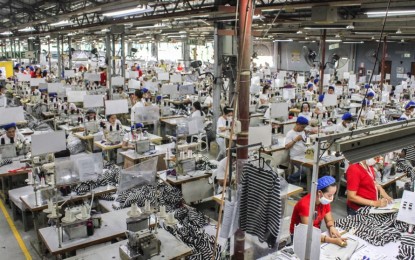
(File photo)
MANILA – The Confederation of Wearable Exporters of the Philippines (Conwep) is seeking government interventions to arrest jobs shedding in the industry.
In a virtual briefing Tuesday, Conwep executive director Maritess Jocson-Agoncillo said the industry group has written President Ferdinand R. Marcos Jr. to express its opposition to the PHP100 legislated wage hike currently approved in the third and final reading in the Senate, which is expected to deteriorate the business condition of wearable manufacturers.
Agoncillo said the headcount in factories of apparel, leather goods and footwear has been declining since 2022, down by 2 percent to 205,800 jobs. It further dropped to 11 percent last year to 182,600 jobs.
She said Conwep projected that the downward trajectory in jobs will continue in 2024, with the figure seen to drop further by 12 percent to 160,688.
Agoncillo said the 12 percent contraction in the number of jobs in the industry this year would translate to a retrenchment of 21,920 employees due to higher cost of operating in the country following the wage increases approved by Regional Tripartite Wages and Productivity Boards in Regions 3, 4A and 4B and, with the most recent adjustment implemented in the fourth quarter of 2023.
This year’s projection does not yet reflect the PHP100 proposed pay hike.
“(A) legislated minimum wage increase is the least we need. It would send the jobs away to competing ASEAN (Association of Southeast Asian Nations) countries such as Myanmar, Indonesia, Cambodia and Vietnam,” Conwep’s letter to Marcos dated on Feb. 26 read.
Data from the ASEAN Federation of Textile Industries showed that daily minimum wages in the Philippines at around USD6.7 to USD11 are the third highest in Southeast Asia. Daily minimum wages in Malaysia stand between USD10.20 and USD12.73, Indonesia at USD4.8 to USD12.15.
ASEAN countries with daily minimum wages lower than the Philippines are Thailand at USD9.6 to USD10.34, Cambodia at USD7.8, Vietnam at USD5.45 to USD7.84, Laos at USD2.5 to USD3.15 and Myanmar at USD2.28 to 2.76.
The wearable industry in Vietnam is also more competitive in the European Union market with its free trade agreement (FTA).
“Last February 22, we received advice from a major buyer in New York that orders would be diverted to Indonesia and Cambodia should there be another wage spike aside from the 2023 regional wage board-mandated increase in the daily minimum wage,” Conwep told Marcos, adding that the US buyer is sourcing from wearable factories in Regions 3, 4 and 7.
“Despite the dire situation, the wearables in the Philippines are recalibrating their factories’ productivity levels to remain a viable sourcing hub for global requirements of quality apparel,” the industry group said.
Agoncillo said Conwep requested to mobilize a Government Inflation Subsidy to Minimum Wage Earners similar to the labor department’s Coronavirus disease 2019 Adjustment Measures Program (CAMP) instead of a legislated wage increase.
Conwep is proposing a PHP1,000 monthly "inflation subsidy" that would be directed to employees, similar to what is being implemented in Cambodia, China and Vietnam.
“We request a two-year ‘inflation subsidy’ to allow the industry to recover as the global demand for apparel exports remains soft until March 2026,” the industry group added.
Agoncillo said the inflation subsidy and not implementing the PHP100 legislated wage hike will sustain the current employment level of apparel, leather goods and footwear factories.
Conwep is also pushing for a more conducive business environment in the wearable sector by directing the Department of Trade and Industry and the Department of Foreign Affairs to work on a sectoral preference program with major buyers and partners across the world. (PNA)
